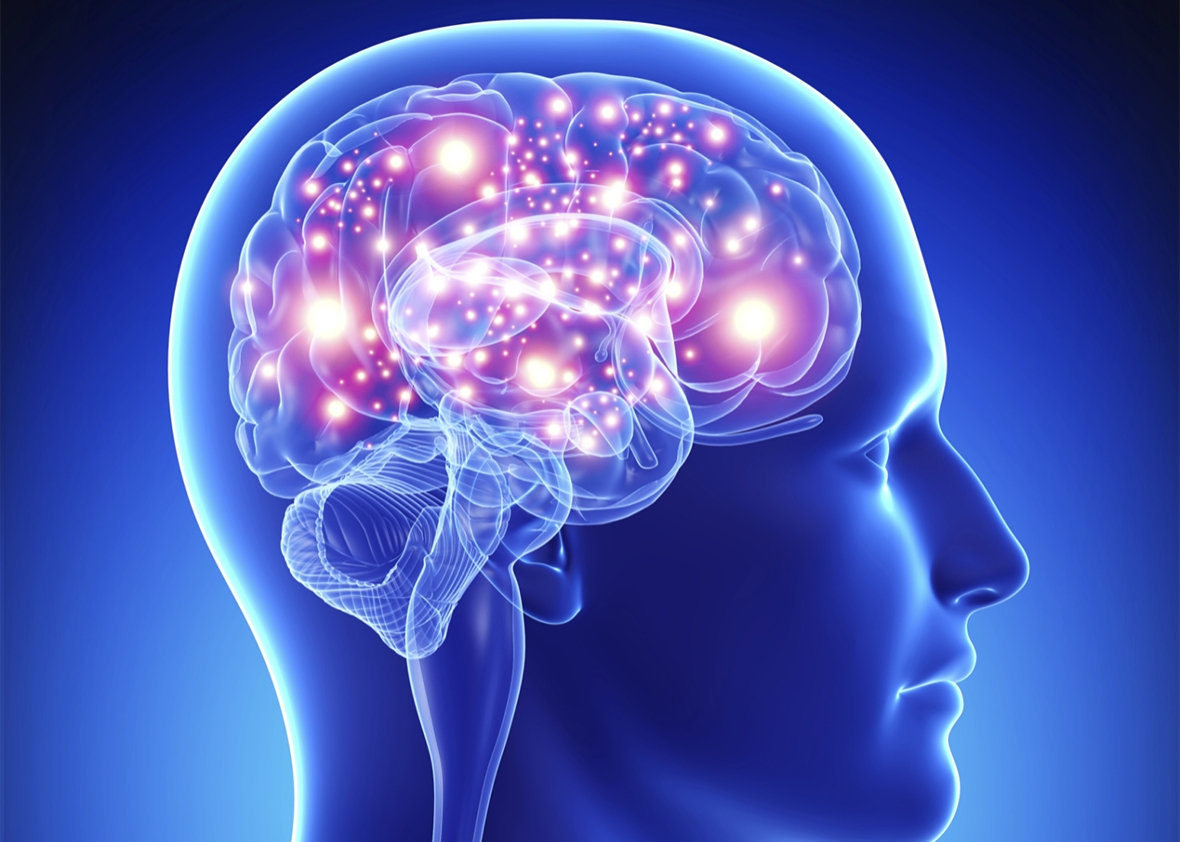There are three types of memory: sensory, short-term/working, and long-term memory. Within long-term memory are subcategories. Episodic memory recalls specific events; semantic memory processes ideas and concepts unrelated to personal experience; procedural memory guides the processes we unconsciously perform, and priming links our memories to a stimulus. Studies of these various types of memory indicate that spaced or distributive practice, in which an individual studies for short periods of time over spaced out intervals, is more efficient for long-term retention than its counterpart, massed practice, in which an individual studies information for a long period without rest. Additionally, memories can also be lost or changed. For instance, retroactive interference occurs when new information blocks or interrupts retrieval of older information. Proactive interference occurs when old, previously learned memories interfere with the recollection of new memories.The human brain has countless abilities, so understanding how your brain works and maintaining a healthy lifestyle, mentally and physically, is as beneficial for improving memory as it is for the rest of the body.
Memories occur when specific groups of neurons (nerve cells) are reactivated, according to the Queensland Brain Institute. Any stimulus, something that evokes a reaction from a part of the body, results in a specific sequence of neuronal activity.The ability to strengthen or weaken synapses, junctions between neurons which form connections, makes the patterns of neuronal activity more or less likely to occur, which is known as synaptic plasticity.
There are three types of memory: sensory, short-term (working) and long-term memory. Sensory Memory is a temporary register of all of the information coming in through ones senses. These include the common five senses of sight, smell, touch, hearing and taste, and the additional senses, including but not limited to ones sense of balance, sense of pain and ability to sense heat and cold. When engaged by a stimulus, sensory memory generally retains information for less than one second, but this can slightly vary based on the vividness of the stimulus. In contrast, short-term memory retains information that one is currently thinking about. It generally lasts for less than one minute and can hold five to nine pieces of information, or various data, at a time.
Long term memory is unique in that it can be subdivided into two different categories which can be further subdivided into two more categories. Long-term memory is also unique in that it describes where information is stored and processed over periods of significant time. As far as scientists know, long-term memory is virtually limitless. Two subcategories of long-term memory include explicit (conscious recall) and implicit (unconscious recall) memory. Episodic and semantic memory are two types of explicit memory. Episodic memory describes recollections of events and experiences while semantic memory details the recollection of words, facts, and concepts. When one recalls ones first day of school, an experience, he or she is recalling an episodic memory. When one recalls the name of a school, he or she is using semantic memory.
Two types of implicit memory include procedural memory and priming. Procedural memory describes the recall of how to complete a task or procedure like riding a bicycle or playing an instrument. Priming is when ones prior experiences influence current interpretations. For example, the words birthday and party are often linked to each other in memory, so seeing one word can prime someone to respond faster when one sees the second word.
Massed practice, more commonly known as cramming, transpires when one attempts to learn material in one or two sittings and is overall less effective for long-term retention. Spaced practice, also called distributive practice, involves multiple study sessions over periods of time and is much more effective for long-term retention.
Sleep is also important for effective memory retention. When one sleeps, The hippocampus [region of the brain primarily associated with learning and memory] and neocortex [a part of the cerebral cortex, which is responsible for sensory perception, spatial reasoning and language] take part in a carefully choreographed dialogue in which the hippocampus replays recent events: the same hippocampal neurons active during an experience become activated again during slow-wave sleep, over and over in a time-compressed manner, helping to update the neocortex as to what needs to be stored, as stated by Help Guide.
The brain, like other bodily organs, requires exercise. Learning a new skill and thinking critically, such as learning a new language or playing an instrument, will result in permanent storage of information. This creates a stronger connection between the neurons. Managing stress, eating a multitude of fruits and vegetables, reducing sugar intake and exercising are also ways to improve memory and overall well-being. Contrary to popular belief, Aging does not have a direct effect on memory, and the loss of memory is simply because you use it less as you age, according to ScienceToday. Basically, as years pass without recalling a memory, the neurons are not reactivated, causing them to decay. Paul Reber, Professor of Psychology from Northwestern University, theorizes that the human brain can hold approximately two and one half petabytes (one million gigabytes) of information. The worlds most powerful computer, Summit, can hold two hundred fifty petabytes of data, the equivalent of two hundred and sixty-two personal computers.
Despite all of its storage space, the human memory is imperfect and takes time to develop like other bodily organs. The inability to remember ones infancy and early childhood is known as childhood amnesia, because the child does not have a fully developed memory. Scientists have gathered four theories centering around why people forget things, which are interference, retrieval failure, failure to store, or motivated forgetting. Proactive and retroactive interference are when old memories interfere with recalling new memories, and vice versa. Retrieval failure is the result of decaying neurons in the brain, when they are not reactivated over long periods of time. Put simply, retrieval failure is a feeling one may have when they know that the memory is there but cannot seem to find it.
Occasionally, losing information has more to do with the fact that the information never made it to long-term memory, which could be due to encoding failures. In a notable experiment from 1978, researchers asked participants to identify the correct American penny from a group of drawings of incorrect pennies, to identify the flaws of those drawings and then to draw the correct penny by themselves. The participants performed poorly in all parts of the experiment. It was concluded that the information is only typically available from memory to the extent that the information is useful in everyday life. Most participants did not feel that it was necessary to know all of the minor details of the penny, so they did not memorize them, and the details did not end up in long-term memory.
Motivated forgetting, also known as suppression, is basically when one purposely forgets by not thinking about disturbing or unwanted events or thoughts. Interestingly, walking through doorways has been shown to cause forgetting. University of Notre Dame Professor of Psychology Gabriel Radvansky explains, Entering or exiting through a doorway serves as an event boundary in the mind, which separates episodes of activity and files them away.
In short, memories play roles in every aspect of ones life and a great memory is an effective tool. It simplifies the process of completing a task and may improve performance on assessments. This results in reduced anxiety or frustration and better social interaction. In short, it is important to protect ones brain from physical and mental harm, to continue developing new skills and absorbing new information. The brain may be hidden from view, but one must protect it to maximize our health and life.
Works Cited:
(2020, April 9). 4 Explanations for Why We Forgot. VeryWell Mind. https://www.verywellmind.com/explanations-for-forgetting-2795045#:~:text=Why%20and%20how%20do%20we,to%20store%2C%20and%20motivated%20forgetting.
ScienceToday. (2018, October 6). 12 Surprising Facts About Human Memory [Video]. YouTube. https://www.youtube.com/watch?v=8OMiLiuDxCo
(2018, July 23). How are memories formed? Queensland Brain Institute. qbi.uq.edu.au/brain-basics/memory/how-are-memories-formed
How to Improve Your Memory. HelpGuide. https://www.helpguide.org/articles/healthy-living/how-to-improve-your-memory.htm
(2019, September 12). Humans Have a Lot More than Five SensesHere are 18. Considerable. https://www.considerable.com/health/healthy-living/humans-five-senses/
| Khanacademymedicine. (2013, October 24). Information processing model: Sensory, working, and long term memory | MCAT | Khan Academy [Video]. YouTube. www.youtube.com/watch?v=pMMRE4Q2FGk |
(2004, August 30). Long Term Memory For a Common Object. Science Direct. https://www.sciencedirect.com/science/article/abs/pii/0010028579900136
(2018, October 25). Meet Summit, The Worlds Most Powerful Computer. Louisville Insight. https://louisvilleinsight.com/archived-news/meet-summit-the-worlds-most-powerful-computer/
(2013, November). Memory. American Psychological Association. www.apa.org/ed/precollege/topss/lessons/memory.pdf
(2011, November 16). Walking through doorways causes forgetting, new research shows. University of Notre Dame. https://news.nd.edu/news/walking-through-doorways-causes-forgetting-new-research-shows/

 Exercise During the Quarantine: Its Importance and How to Implement It in Your Own Life
Exercise During the Quarantine: Its Importance and How to Implement It in Your Own Life